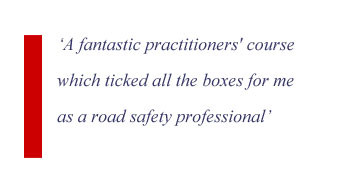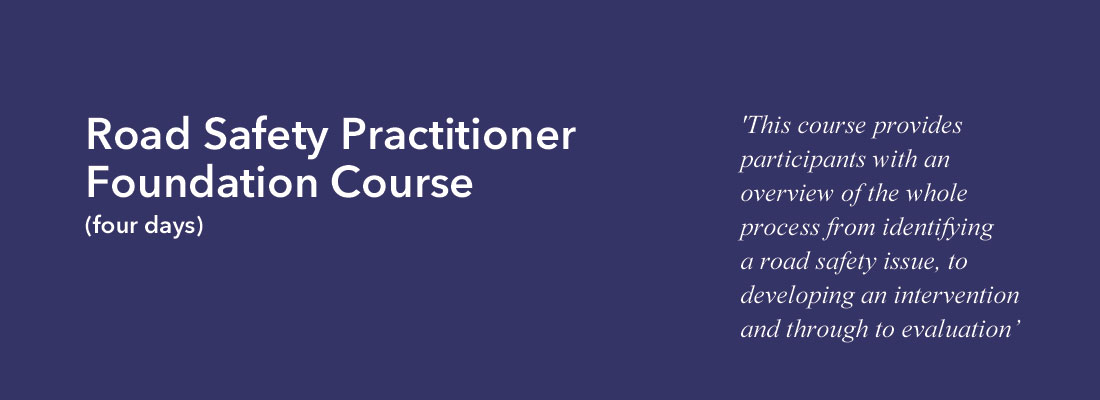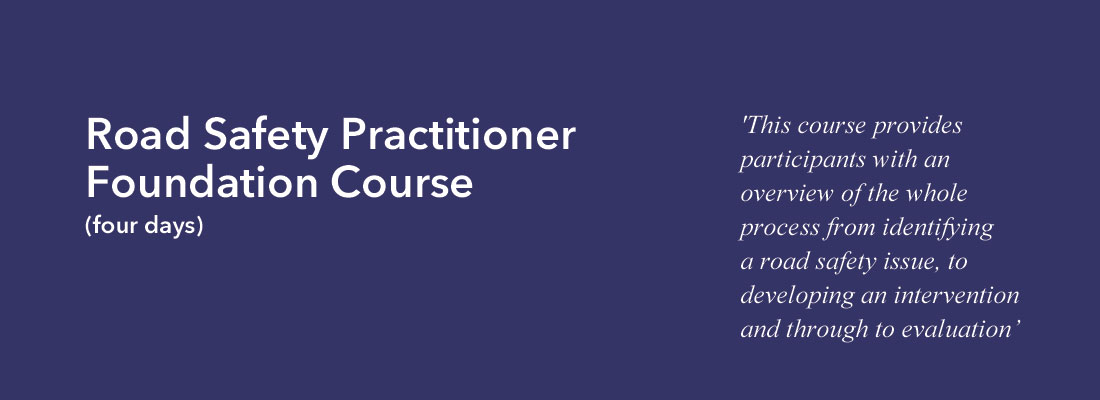Course fees
£485 for Road Safety GB Academy members (plus VAT)
£660 for non-members (plus VAT)
Scroll to the foot of the page for current course dates and venues.
Course feedback
Evaluation
Course booking terms, conditions and cancellation policy (PDF download)
 Overview
Overview
Over the last two decades road safety practice has developed significantly and is now widely recognised as a specialist area of education.
Recognising this, the Road Safety Practitioner Foundation Course aims to provide participants with an overview of the knowledge and skills they need to effectively and safely deliver a road safety educational intervention.
By the end of the course a participant will be able to:
• Assess the need for, and critically analyse, an educational intervention (based on data)
• Understand the importance of research and evaluation
• Understand the need to work in partnership with other organisations
The course provides participants with an overview of the whole process from identifying a road safety issue, to developing an intervention and through to evaluation.
The course is structured around a project and takes participants through all elements of its development. Ideally this should be a ‘real’ project that the participant is currently working on but if this is not possible the participant is given a project to develop.
The course comprises four-day contact time broken into 2 X 2 day sessions with approximately five weeks between the two sessions. Over this five-week period participants are required to complete an assignment relating to the topic covered in the initial two-day session. A final assignment, which forms the final assessment, has to be completed four weeks after the second session.
The course is based on the Road Safety GB Road Safety Practitioners Standard which outlines a road safety practitioner’s role as follows:
A Road Safety Practitioner’s role is to provide, or facilitate the provision, of road safety education and training that seeks to establish, maintain and adapt personal road user behaviours that maximise safety.
Who should attend the course?
The course will provide participants with an overview of the whole process from identifying a road safety issue to course development and evaluation. The course is designed for all road safety practitioners currently involved with, or delivering, road safety interventions and is ideal for:
• Someone who has just entered the road safety profession or who is taking on a road safety role as a secondary task.
• Someone with experience who would benefit from achieving a qualification in road safety.
Course aim
If it is not well researched and correctly delivered, road safety education can have unintended consequences that may be counterproductive post-intervention. Anyone involved in the delivery of road safety education needs to be aware of, and alert to, this danger.
This course aims to deliver the basic skills, knowledge and understanding an individual should have prior to delivering a road safety intervention.
Course units
- Unit 1: Prepare, deliver or evaluate a road safety education intervention
- Unit 2: Design a learning programme
- Unit 3: Enable safe and responsible road user behaviour
- Unit 4: Manage safety
- Unit 5: Evaluation
Unit 1: prepare, deliver or evaluate a road safety education intervention, taking into account the need to work with others within an ethical and legislative framework
The aim of this Unit is to ensure that all road safety practitioners understand the complex interrelationship between the many organisations and individuals that have an interest in road safety and how to work in partnership with them within an ethical and legislative framework. It is important that a road safety practitioner has a working knowledge of the associated issues in order to ensure that these are considered throughout the development, delivery and evaluation of an intervention
This Unit is split into 3 sub-units covering:
- Understanding the wider context of road safety and the need for partnership working
- Understand the ethical issues associated with the delivery of road safety education
- Working within a legislative framework
Unit 2: design a learning programme
In order to ensure that the resources are used in the most efficient manner it is vital that a road safety practitioner is able to use a research based approach which should underpin the initial identification of need and the intervention’s design and evaluation. A research led approach has a number of benefits including:
- Targeting of the intervention to address specific areas of concern;
- Incorporating prior learning into the design of an intervention;
- Reducing the risks associated with unintended consequences:
- Enabling the success of the intervention to be monitored and further enhanced:
- Improving financial management of the project.
Unit 3: enable safe and responsible road user behaviour
As already mentioned within this document the role of a Road Safety Practitioner is to provide, or facilitate the provision, of road safety education and training that seeks to establish, maintain and adapt personal road user behaviours that maximise safety.
There are many steps in achieving this goal, from developing subject specific knowledge, understanding and skill through to being able to transfer this to all environments and contexts. This process requires that the road user not only understands what to do and how to do it, but is also aware of themselves and personal barriers that may prevent them from behaving in a way that minimises risk.
Unit 4: manage safety
Safety is of paramount importance in the delivery of road safety interventions. Many interventions are delivered on road and it should never be forgotten this is a live safety critical environment that needs to be carefully managed to ensure the safety of the participants, other road users and road safety practitioners. Even where on-road training is not taking place, safety needs to be actively considered with suitable control measures in place to ensure the safety of all involved.
Unit 5: evaluation
It is vital that robust evaluation is completed when implementing any road safety initiative. Without evaluation it is very difficult, if not impossible, to:
- Ensure the intervention is achieving its objectives;
- Ensure that resources are being used effectively;
- Develop the intervention further;
- Inform other interventions.
Qualification
By the end of the course a participant will be able to:
- Assess the need for an educational intervention based on data
- Critically analyse an educational intervention
- Understand the role that research and evaluation has in road safety education
- Understand the need to work in partnership with other organisations
Learning will be assessed by completion of an assessment task, to be returned within 4-weeks of course completion.
Guided Learning Hours (GLH)
70-80 hours
Course dates and venues
9-10 July 2025 (part 1) & 10-11 September 2025 (part 2)
Delivered via Zoom
Book this course
In addition, courses can be delivered for groups on request – contact Sally Bartrum by email or on 01379 650112.
Invoicing, payment & cancellation
- Delegate fees are due payable upon booking unless a valid Purchase Order is provided and accepted.
- For online bookings paid at the time of booking, invoices/receipts will be issued electronically on completion of the booking.
- Please issue Purchase Orders to ‘Road Safety GB International’ and forward via email to: rsgbcourseinv@gmail.com.
- Invoices will be issued and sent via email and must be paid within 30 days of the invoice date or no later than one working day prior to the start of the course, whichever date occurs soonest (the“due date”).
- Payment must be made in pounds Sterling by cheque, credit/debit card or BACS, using the details on the invoice.
- For more information please contact Sally Bartrum by email or on 01379 650112.


